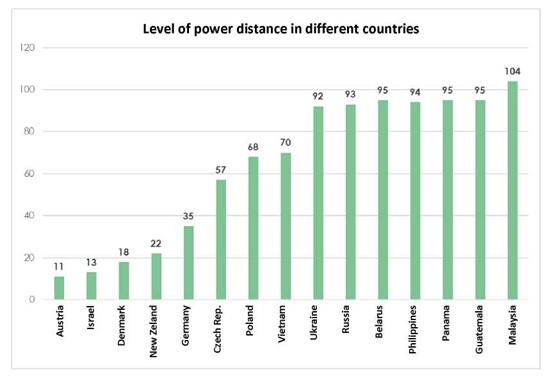29.06.2020 – Cultural dimension related to power distance
As we wrote before, cultures can differ in many ways, which are referred to as “culture dimensions”. These are areas or fields in which different cultures function differently. One of the dimensions differentiating cultures is the approach to hierarchy in a society and the attitude to authority, which is associated with a cultural dimension called power distance.
Power distance is defined as “the scope of expectations and acceptance of unequal distribution of power expressed by less influential members of an institution or organisation”. The distance to power can be large or small. Societies with a short power distance are mostly rich countries with a strong middle class, societies with a long power distance are mostly poorer countries with a weak middle class.
Cultures are differentiated by their approach to hierarchy in society, which manifests itself in their attitude to authority.

Societies with great power distance
In societies with great power distance, inequalities between people are considered legitimate and desirable. People in the lowest positions in the group accept this situation and the fact that they are subject to someone, depend on them and should obey. The person in power seeks to show superiority, e.g. by a large car or by addressing other people from above.
Differences in the power distance may be reflected in the working environments. In countries with great distances to authority, there are strongly hierarchical relations and subordinates are dependent on their superiors: a subordinate is obliged to listen to his superior and follow his instructions without any space to discuss the tasks entrusted to them. Subordinates even expect their superiors to show them the tasks to be performed. Managers are characterised by a great distance towards employees. Employees are regularly inspected and evaluated, and general acceptance is expressed for privileges and signs of status. Hierarchy is visible, manifested by inequality between people, acceptance of large differences in salary levels between higher and lower positions.
That situation may also apply to the school. In countries with a long distance of power, children must treat teachers with respect and obey them unconditionally. Only teachers can take initiatives during classes. Teachers give students the knowledge and wisdom they have, but children do not have the right to ask questions or question the knowledge they have given.
Finally, that situation can relate to a family where the roles and responsibilities of the parents and children are very specific and there is no room for building partnerships between family members. Relationships between children and older generations are based on respect and obedience – this model also functions when children are already adults. In old age, children provide care to their parents.
Societies with small power distance
In case of societies with small power distance, there is a belief that inequalities between people should be reduced and social relationships should be of particular concern. The people of such countries are responsible and take the initiative. They understand that each member has an influence on what is happening in the country, they are active in society and they express their attitude to power.
In working environments existing in cultures with a small power distance, subordinates are treated on an equal footing with their leaders, there is mutual respect between managers and subordinates. Despite a certain hierarchy of positions, supervisors and subordinates should be interdependent. Subordinates feel comfortable in the interdependence situation they find themselves in. Employees are equal to each other, treated on an equal level, there are small differences in salary levels. The relationship between the subordinate and the employer is a cooperative one, subordinates expect managers to consult their decisions with them. Privileges and signs of status are not recognised.
In schools, teachers expect children to take their own initiatives. The quality of teaching depends not only on the level of the teacher, but also on the level of the pupils, as well as on communication between the two.
In family, child is allowed to make decisions, try and learn from their own mistakes. Relationships in such a family are purely partnership and aim at the autonomy of each family member.
Differences in power distance create great scope for misunderstanding. People from a culture with a short distance of power will expect that e.g. a clerk will be a partner in the discussion, an assistant when discussing a case. Others – coming from a culture with a high power distance, that it is a higher instance, for which one has to seek considerations. This is related to the attitude to corruption. In some countries it is obvious that gifts are given to an official who takes care of a case, so for representatives of these cultures, rejecting a gift by an official is incomprehensible and even rude behaviour. In Poland, this type of gratification for settling an official matter is not accepted and is treated as a bribe.
The power distance is measured on a scale from 1 to 120. The lower the score on the scale, the smaller the power distance in a country, the higher the score, the greater the power distance.
Level of power distance in different countries – the lower the score, the smaller the power distance in a given country.

Source: Own study based on: https://www.hofstede-insights.com
It is difficult to state clearly whether the power distance dimension has an impact on achieving greater efficiency. Organisations with a small power distance achieve better results in the implementation of tasks requiring initiative on the part of their subordinates. Cultures characterised by a large power distance are more successful in undertakings that require a large discipline.
As far as education policy is concerned, in societies with a large power distance, higher education is considered the most important, while in societies with a small power distance, secondary education is considered the most important.
Interestingly, some languages, such as Vietnamese, have special pronouns in their grammar, indicating the attitude of the speaker to the person they address. They depend on family relations and the social position of the persons involved in the interaction.
It is worth remembering that cultures are transforming constantly.




 Projekt „Kompleksowy system wsparcia w zakresie adaptacji i integracji ze społeczeństwem
Projekt „Kompleksowy system wsparcia w zakresie adaptacji i integracji ze społeczeństwem